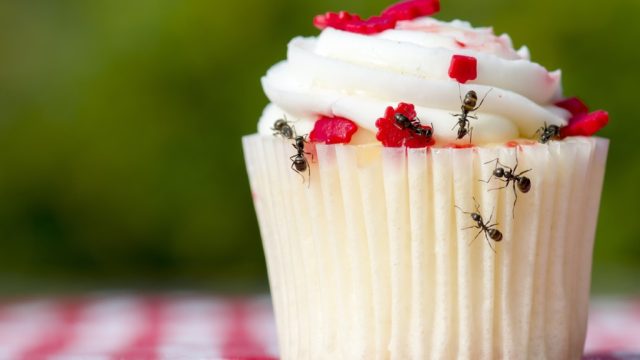
It's the most neighborly question of them all. You're engaged in idle chit-chat, some niceties and "How're the kids?" are thrown around, and bam: you're asking them if they have any idea how to get rid of ants that have suddenly made themselves at home in your kitchen, mudroom, bathroom, bedroom. Despite every attempt to keep your space clean and tidy, it often feels like an armada of the pests is an ever-encroaching force, and there's nothing that will stop them from treating your home, and all its contents, like a free-for-all buffet.
And while ants aren't necessarily dangerous bugs, they're still a major nuisance. As Gil Bloom, entomologist and president of Standard Pest Management, says, "We care more about ants than they care about us." Fortunately, there are countless measures that can be taken to let ants know they're unwanted guests—and we've collected the best of the best. From the subtle to the extreme, we've compiled a list of how to get rid of ants in your home and garden and everywhere in between. You'll never need to bug your neighbor again.
Set out some cucumber peels.
Because of a chemical compound contained in cucumbers that kills certain fungi, insects have a natural aversion to the vegetable's smell—making it a perfect, all-natural solution when you're brainstorming how to get rid of ants. To use this fact against the pests, slice off the skin of a cucumber (because it is the most bitter part it will have the greatest effect) and place bits of it in places where the ants are seen emerging. Be careful, however, not to let the cucumbers lay around for the too long, or they may become attractions for different kind of hungry visitor.
Spread out some coffee grounds.
Want to know how to get rid of ants and dispose of some household waste in one fell swoop? Sprinkle some coffee grounds around your home and garden. Due to coffee's high nitrogen content, grounds burn ants' legs when they walk on it. Simply sprinkle some used grounds around the ants' entrance into the home to stop them from entering.
Set out some lemons.
Citrus fruits contain an acidic oil on their skins which is so toxic to ants that it will kill them on contact. However, all you need to do is repel them, so squeeze a few drops of lemon near their points of entry and leave the lemon peel there to let them know you're ready for war. The ants, if they know what's good for them, won't return.
Grind up some black pepper.
Dropping black pepper grounds near an ant's point of entry is one of the fastest ways to scare it off. And as it should be: the substance has been shown to kill them. So, for anyone who's eager to know how to get rid of ants with only the things on their dining room table—besides the salt—try sprinkling black pepper around any cracks the ants frequent to gain entrance to your home.
Keep things tidy.
Keeping your home clean is one of the easiest ways to prevent ants from getting inside in the first place. "Food is usually one of the main reasons why ants make their way into people's homes," says Karen Thompson, main editor of InsectCop.net, "[so] make sure you keep your kitchen and dining room clean." Just getting rid of crumbs can go a shockingly long way, she says, towards shutting down an ant infestation—or even better: stopping one before it begins
Close up cracks.
"Ants are able to get inside of your home through even the smallest of cracks," says Thompson. So the first thing a homeowner should do to avoid these unwanted guests is sealing up all visible cracks and crevices in the home. While there are a few different products which will do the job, choosing something sturdy like caulk, spray foam, steel wool, or cement patches is recommended for a long-term solution.
Check your gutters.
Moisture ants are a popular species of home invader and, as per their name, they love moisture, nesting in decayed wood damaged by water. Along with the expected locations for liquid build-ups—bathtubs, sinks, and other places water goes and comes from—Brad Smith, owner of Preferred Pest Control, recommends checking your gutters. If they aren't properly cleaned, he warns, this could be "creating excess moisture around the foundation" of your home, a welcome invitation to any nearby moisture ants.
Find the source and set out baits.
"For every ant you see," warns Kent Edmunds, CEO of Paul's Termite and Pest Control, "there are usually tens or hundreds you don't see." While eliminating a solo scavenger may feel justified, it's ultimately only a momentary victory, as the ant colony they came from will continue to produce. Instead, he says, "try baiting with honey or sugar water and following them to see where they're coming from." This is most effective at night—when ants are most active—and will allow you to deal with the root of the problem, as opposed to merely tackling symptoms.
Determine the type of ants you're dealing with.
"The best way to remove ants from your home," says Edmunds, "has a lot to do with the specific type of ants that have infested your space." Different species, he explains, have different behavior and mating habits, making some more susceptible to certain methods of removal than others. So before getting down to the business of removal, try discerning what kind of ants you're dealing with. If a Google search won't do the trick, consider sending a picture of your infestation to a local expert.
Trim your hedges.
Outdoor hedges that touch the sides of a home can provide "easy access" for ants and other pests to get inside, says Edmunds. Trimming nearby shrubbery—maintaining a space of at least two feet between plant leaves and outdoor walls—can go a long way towards getting ants to reconsider their choice of a second home.
Beware of bringing the outside in.
If you've ever wondered how to get rid of ants (as well as bugs like mosquitos), the best solution is always to avoid letting them inside in the first place. So beware of bringing wood piles, potted plants, and other items in which the critters may be lying low into the home. If necessary, consider spraying these items with repellants before putting them indoors.
Use vinegar spray.
"Strongly scented sprays," recommends Jordan Foster, a pest technician at Fantastic Pest Control. "[They] work remarkably well and are cheap and easy solutions." His favorite, he says, is a vinegar spray made up one part white vinegar and one part water. While warning that the mixture has "a mild scent which some people may not like," he urges that if you're "looking for a quick solution, this is it."
Reduce mulch build-up.
Great for controlling weeds, mulch can also act as a perfect home base for a new colony of ants. While eliminating the stuff altogether may not be the option, consider keeping any of the organic variety away from the border of the home, along with "reducing the amount of built-up mulch" in existing plants beds, recommends Jon Charnery, owner of Price Termite and Pest Control.
Spray peppermint around your home.
If vinegar isn't your cup of tea, there's another, more sweet-smelling scent, sure to get rid of ants. To make this essential oil spray, says Foster, mix twenty-five drops of peppermint or eucalyptus oil with a cup of water. Then, spray the mixture around the perimeter of your home. In addition to repelling ants, Foster says, this "will give the room a nice fresh scent."
Put boiling water and castile soap in an anthill.
If the ant infestation is outdoors, pouring boiling water and castile soap into the entrance of their colony can help, says Foster. An easy way to do this is placing an upside-down flower pot on top of the colony, pouring the solution slowly through the small opening.
Sprinkle some boric acid.
While this solution will only work on ants of the house variety, and not carpenter ants, it can still be extremely effective in shutting down the former's entrance possibilities. Simply "sprinkle the [boric] acid around the entry points of the ants," says Matteo Grader, pest control specialist at Panther Pest Control, and let it work its magic. "It will act as a repellent," he says, because no matter how strong the urge may be, "they won't cross the acid."
Spread out some diatomaceous earth.
Wondering how to get rid of ants, particularly carpenter ants? Don't despair, says Grader: simply use diatomaceous earth rather than Boric acid. The cheap, naturally occurring powder can be purchased at most gardening or home care stores and, when sprinkled near the pest's entrance, will stop them in their tracks.
Use salt.
If you want to find out how to get rid of ants without purchasing any new products or making your kitchen spic-and-span, try salt. Like most insects, the substance dries them out and will be avoided like the plague. Simply boil water and dissolve a large amount of table salt in it. Then, when it comes time, spray the solution—liberally—in all the places you find ants, and say goodbye to your unwelcome six-legged guests.
Draw some chalk lines.
Because it interferes with their scent trails, a heavily-drawn line of chalk can act as a strong homemade ant repellant. Simply draw a line "wherever you've seen ants come in," says Grader, and they'll stop short in their tracks, not knowing where to go. Continued vigilance is required, however, as the colony will eventually begin laying new scent trails, rendering your chalk wall less than effective.
Plant pennyroyal.
Want to know how to get rid of ants without taking away any time from your usual gardening routine? Look no further than pennyroyal. The plant, native to Europe and a member of the mint family, has been known since time immemorial to repel insects—ants won't even walk on it.
Erase their trails.
If you've ever wondered how to get rid of ants and keep them from coming back for good, the solution is simple. Each time an ant crawls through your kitchen, it leaves a scent trail directing one of its buddies to their new haunt. However, by cleaning any spots where ants have made their merry way using soap, the scent trail is erased, leaving the next ant at your doorstep without a road map. While this won't kill the ants, it's a good first step to slow down the invasion as you look for further, more long-term measures.





















